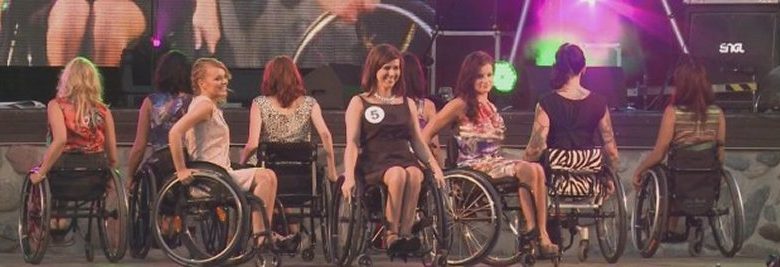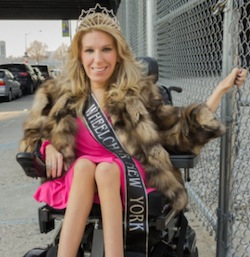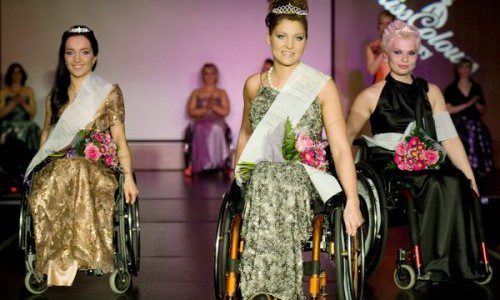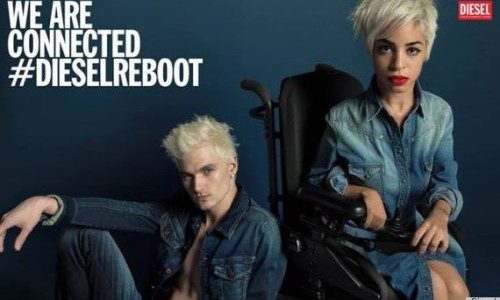
Disabled beauty pageants: why don’t we hear about them?
Did you know that the United States has hosted beauty pageants for people with disabilities for many years? To date, there have been numerous staged events that welcome the broad spectrum of disability, and frequently they have been backed by wonderful intentions.
The focus has not been on beauty alone, but also on qualities of greater substance, including academic and professional accomplishments, as well as community involvement Many women with disabilities, who have graced these stages and competed admirably, have been women of extraordinary achievements.
So why do we not know about these women, capable of making valued contributions to the disabled community, as well as society as a whole? The answer is part of a much larger issue: there is a lack of integration of those with disabilities into the canvas of diversity that the American media and the political culture attempt to promote.
 In spite of major strides, people with disabilities remain highly stigmatised and segregated. Although the existing disability pageants admirably promote beauty, accomplishment, and glamorousness, they are still regarded as niche events, to be promoted to special audiences only.
In spite of major strides, people with disabilities remain highly stigmatised and segregated. Although the existing disability pageants admirably promote beauty, accomplishment, and glamorousness, they are still regarded as niche events, to be promoted to special audiences only.
The qualities that these contestants have and embrace – attributes that exist in many of us and are considered to be universal – are somehow assigned with a special meaning, making the person ‘other’, separate from the rest of us. The likelihood of finding a contestant with a disability in some of the well-known pageants – Miss Teen USA, Miss USA, and Miss America – is exceedingly small.
I’m reminded by this of a parallel situation a friend found herself in. Working as a model in a wheelchair, she telephoned a major modeling agency to inquire if they were looking for any models with disabilities. The agency informed her that they only had two divisions, a male and a female one, so she would probably have to find another agency that has a ‘special’ division to accommodate her.
Society in the United States does not regard people with disabilities as attractive, social and sexual beings who function freely and competitively within a diverse population, therefore, we are not included within the norm. Pageants for people with disabilities remain in the shadows, reflecting the way disabled people are looked at in our society.
Furthermore, the way that many pageants are narrowly categorised for people with different disabilities reflects the isolation of groups of disabled people in this country – a community that remains disjointed and not united unlike other minority groups who have united into powerful forces i.e. the LGBT, Hispanic, and African-American populations.
To tackle this, I have been promoting my own large-scale campaign that calls for society to recognise the beauty, glamorousness and sexuality of people with disabilities. The aim is for us to be integrated fully into fashion and beauty industries, as well as mainstream beauty pageants.
Just as Miss USA and Miss America include people of different races, why not allow audiences to appreciate the beauty of contestants with a disability? Or, to battle the stereotypes and stigmas from another angle, why not promote pageants for the disabled at the same level of commercial intensity that accompanies promotion of the above-mentioned mainstream pageants?
We need high-end sponsors, who recognise the purchasing power of the disabled community, to come on board. This will increase the level of glamour and celebrity participation, in turn increasing the visibility of pageants. We need to pull disability out from the corner and beginning to normalise the fact that all bodies are different, a concept that the beauty industry alleges to support.
Fortunately, we are seeing some movement in this more positive direction. Most recently, during the Miss Idaho 2014 Pageant, when the winner, Sierra Sandison, chose not to hide her insulin pump during the pageant, which she uses to treat her Type 1 diabetes. Instead, she confidently strutted with the pump clipped to her bikini. This small pump created big waves as Ms. Sandison successfully introduced disability into a mainstream pageant.
Also in the United States, both my ‘walk’ down the runway during New York Fashion Week, and wheelchair-user Jillian Mercado’s appearance in a Diesel advertisement, were powerful strikes against the fashion/beauty fortress, an industry that has thus far virtually excluded models (and consumers) with disabilities.
Looking internationally, we can see progress on the front of unity and high-end promotion of pageants exclusively for people with disabilities, and the power that results in.
- At the first Ms. Poland in a Wheelchair Pageant last August, the Polish Prime Minister Donald Tusk was in attendance.
- The Miss and Mister Deaf International pageant has had sponsors that include Fashion News Live (FNL), The Body Shop, and Novotel Hotels, among others.
- Angolan women compete for the Miss Landmine sash in a beauty pageant for women with prostheses. Press and the red carpet are involved, and contestants are photographed in typical fashion-industry poses.
- The Armenian beauty pageant for women with disabilities has the goal of attempting to capture all of the Armenian public’s attention and focus it on their disabled citizens.
- The Miss Colours Hungary, Ms. Wheelchair India, and the Beauty of the Crescent Moon pageant in Vietnam, garner nationwide support with their high-end pageant productions.
Although the traditional beauty pageant in America has had its opponents, the inclusion of people with disabilities in mainstream pageants, and/or the unifying of pageants organised strictly for disabled contestants, will help create a more high-profile diversity in the pageantry culture.
This will help normalise the concept that beauty and disability are not mutually exclusive phenomena. Wide public realisation that beauty can combine with a disability, will ultimately lead to the healthy appreciation of the beauty inherent in all of us, disabled or not.
By Dr Danielle Sheypuk
Dr Danielle Sheypuk is available for therapy sessions, seminars, keynote speeches and other speaking opportunities. She can be contacted at sheypuk@hotmail.com or via her website: www.daniellesheypuk.com.
Check out…
• Undressing Disability: celebrating all bodies and campaigning for change
• Disability and sex: lets be frank about sex toy
Tell us what you think about disabled beauty pageants? Do you think they should be more widely publicised? Join in the conversations by messaging us on Facebook, tweeting us @DHorizons, emailing us at editor@disabilityhorizons.com or leaving your comments below.

